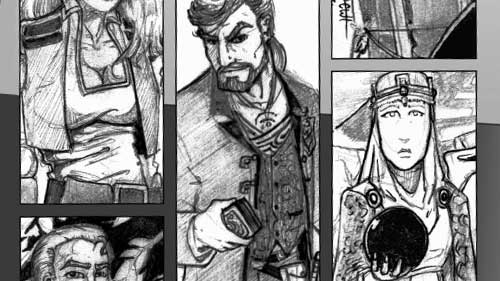I was recently exposed to a rather interesting alternate RPG system written by the folks over at Evil Hat Productions. Traditionally, published roleplaying games will have an assumed setting built into its game mechanics. This is often in the form of a series of core attribute statistics that define how strong, nimble, smart, or persuasive a given character is, and reinforced through systems of character classes and pre-defined skills. Characters built within these parameters lend themselves, in theory, to the assumed setting. This is the case with World of Darkness system, Deadlands, or Dungeons & Dragons.
Others attempt to be universally-applicable. They do so by modifying an existing ruleset to include a preponderance of additional skills and rules tacked onto the older system (d20 Modern and Palladium strike me as good examples), or by creating an amorphous uber-system like GURPS.
Fate takes a third, higher road, by imposing a ruleset that revolves around types of attributes, not the specific definitions thereof. Characters have various Aspects and Skills, and some number of Fate Points. The nature of those Aspects, and the particulars of the definitions of those Skills are left to the gamemaster and players to work out, with an emphasis on relevance to the story instead of absolute quantities. For example, to create a brave sword-wielding adventure of prodigious strength, a D&D player may create a Fighter character with a high Strength score. He’ll also have Dexterity, Constitution, Intelligence, Wisdom, and Charisma attributes, but none of these are key to the character concept; they’re present to satisfy the character-creation process. A similar character in the Fate system may have Aspects invested in “Prodigious Strength” and “Brave,” and Skills invested in swordsmanship.
The Aspects can be just about anything (the core ruleset has examples ranging from “intelligent” to “expendable”) , and frankly so can the skills (which can include supernatural skills such as psychic or magic powers). Lest this seem entirely too free-form, a great deal of the 90-page core document revolve around ways to narrow things down to suit the needs of your setting and your story.
Toward this end, I’m thinking of writing up an overlay of sorts for the Iron Kingdoms. Before I get too deep into it, I’ll need to decide how detailed I’ll want to get. If this is just some intellectual exercise, it can be as specific as the current campaign I’m running using d20. If it is to be more generally-applicable, skill sets and aspects need to be considered for aspects of the setting that I don’t intend to personally use.
